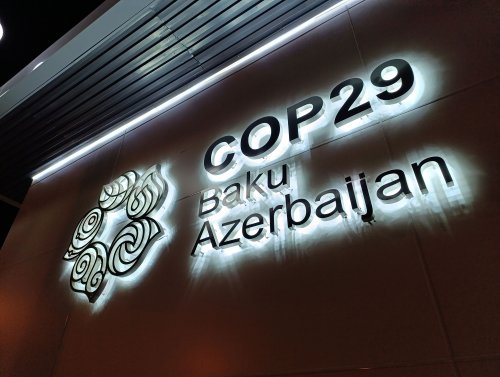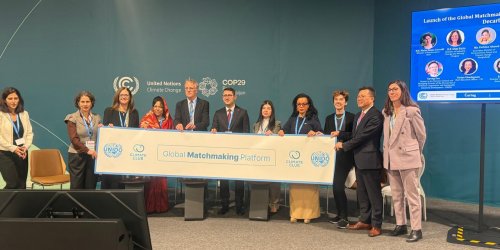The strained relations between the US and China have created a serious challenge for the COP27 UN Climate Change Conference, which will be held in early November in Egypt.
Kevin Mo, director of the think tank Innovative Green Development Program, said it is hard to imagine US-China cooperation again promoting global climate action, reports S&P Global.
The article recalled that China decided to end climate negotiations with the United States after the visit of Speaker of the House of Representatives Nancy Pelosi to Taiwan in August 2022.
Also relations between the two states have deteriorated due to US attempts to exclude China from the list of developing countries, which will fundamentally change China's position in negotiations. In addition, the US has banned imports of some Chinese solar products and stepped up its own research and development to counter Chinese imports.
"Developing countries are facing debt crises and have been hit hard by disasters caused by extreme weather due to climate change. China may be asked to contribute to climate finance [if it is reclassified as a developed country]," Mo said.
The material noted that during climate negotiations in 2021 at COP26, the United States and China prepared a joint statement on various types of cooperation, including carbon capture and storage, development of renewable energy, reduction of methane emissions, and cross-border carbon trading. China has also committed to developing a national action plan to reduce methane emissions before COP27, which has not yet been published.
New partners
The authors emphasized that, how In future talks, China is expected to seek new partnerships with developing countries to encourage investment in renewable energy while rejecting "green barriers," namely trade barriers created to protect the environment.
Such partnerships target potential members and new demand for solar and wind products in Southeast Asia, the African Union, the League of Arab States, the Shanghai Cooperation Organization and BRICS (Brazil, Russia, India, China and South Africa).
The authors noted that China's proposals are partly a reaction to moves by the US, Europe, India and Indonesia to build their own solar industries. And the China Photovoltaic Industry Association expects an increase in trade conflicts in the near future.
For example, the United States has banned products produced in the Chinese region of Xinjiang, unless importers can prove that the goods were not produced using forced labor. This will have a significant impact on Xinjiang's exports of polysilicon, a key ingredient in solar panels.
Coal industry
The article noted that China is likely to remain cautious about coal, which accounts for 65% of the country's total generation.
"We cannot abandon the transition due to temporary difficulties, from COVID-19 to the energy crisis, nor should we lose sight of reality and rush to quick results," said Chinese Foreign Minister Wang Yi.
Mo noted that given the current global energy crisis and the resulting delay in reducing coal-fired power, every country now faces a conflict between the goals of short-term energy security and long-term net-zero transformation.
The authors emphasized that China is also concerned about the attempt by developed regions to push developing countries to accelerate decarbonization and raise the price of carbon.
"In the face of global challenges, all parties must abandon unilateralism, geopolitical rivalries and green barriers. Developed countries should significantly advance their timetable for achieving carbon neutrality and create more room for development for developing countries to restore trust between the North and South with the help of specific actions," Wang Yi said.
Central Bank of Ukraine
The article noted that China views the EU's carbon border adjustment mechanism (CBAM) as pushing climate issues into a trade conflict and violating the rules of the World Trade Organization.
After all, China is the largest trading partner of the EU for products covered by the CBAM. In particular, imports of steel, aluminum, cement, fertilizers, electricity, organic chemicals, plastics, hydrogen and ammonia.
The authors added that Chinese industry is also concerned that detailed emissions information may affect data security, while an expensive carbon tax will certainly affect the economic competitiveness of their export products.
"It remains to be seen whether this COP will provide a channel for China and the EU to discuss a mechanism that, if implemented as planned, would require importers to start reporting from next year," the report said.
Mo also added that an important area for this COP27 will be the question of how China feels about the Climate Club and whether it will participate in it.
Promoted by German Chancellor Olaf Scholz, the club was adopted by the G7 in June and aims to accelerate international climate action through partnership and cooperation. It is open to all countries, including China.
"Perhaps this is a positive combination to ease current geopolitical tensions at both COP27 and the G20 summit in Bali, scheduled for November 15-16," the article said.
The authors noted that there is hope that progress will be made on the policy framework for a carbon credit registry and a centralized accounting and reporting platform at the UN Framework Convention on Climate Change monitoring body.
Earlier, EcoPolitic wsrote, that analysts believe that at the UN climate summit COP27, which will be held on November 7, 2022 in Sharm el-Sheikh, Egypt, pressure will increase on governments, regarding the detailing of the plans for the "green" transition, taking into account all the challenges.
As EcoPolitic previously reported, in most Asian countries, prices and carbon taxes are too low, to have a significant impact on the fight against climate change and to force polluters to reduce emissions.





